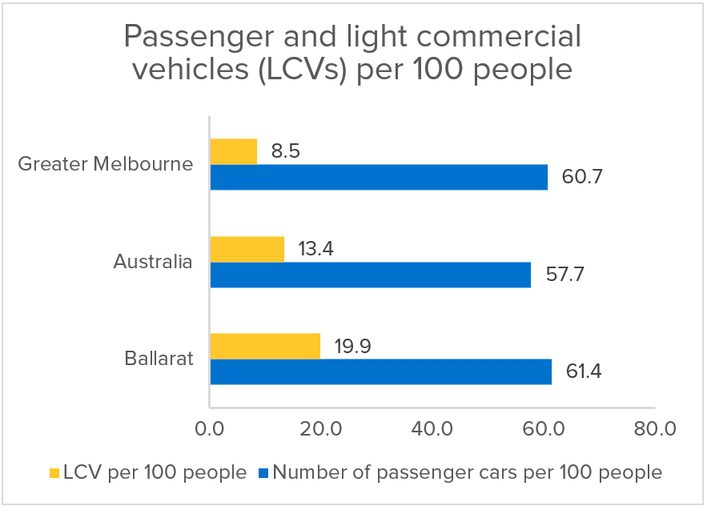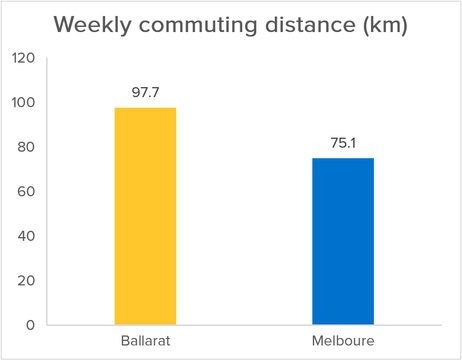It wasn’t that long ago that senior Australian government ministers were warning that electric utes would bring an effective end to the great Australia lifestyle – “they won’t tow your boat” and they’d “ruin the weekend”, the country was told.
Now, under a new government, ministers are happy to be promoting them, and standing next to them, which is what federal infrastructure and transport minister Catherine King did on the weekend in Ballarat, in the heart of her own electorate, where she was flanked by one of the first electric utes in Australia (an LDV eT60).
King was there to launch the Recharging Ballarat report commissioned by Solar Citizens, which underlines how a strong federal Fuel Efficiency Standard is likely to save drivers in regional areas millions of dollars in annual fuel costs, improve local health outcomes, and cut transport related pollution and greenhouse emissions.
Their findings suggest that the introduction of a Fuel Efficiency Standard for Australia, equivalent to what is already in place in Europe, should cut the region’s fuel bill by between $80 million to $101 million for Ballarat motorists over five years.
The report also suggests that the introduction of a strong federal Fuel Efficiency Standard would increase the supply of affordable EVs and help to address the rising cost of living in regional areas.
As I wrote for TheDriven last year, Fuel Efficiency standards need a three layered approach:
- Better fuel quality in order to:
- implement more stringent vehicle pollution controls that together:
- allow for the setting of greenhouse gas emission standards that may be based on either:
- stringent CO2 pollution limits or
- overall vehicle fuel economy. (As requiring reduced fuel use coupled with cleaner vehicle emissions also leads to effectively the same outcome).
What sort of Fuel Efficiency Standard we will see from the Federal Government is still under wraps – although the Minister did make a few comments relating to what may be coming.
Firstly, the delay in announcing the policy was in part due to the sheer volume of submissions that were received following the call for public input on the topic in September last year.
As a result, the government was still working through the submissions in order to formulate their response. Secondly, the Minister emphasised that the policy needs to be strong on practical outcomes.
King also mentioned that whilst her department will be focussing on the fuel efficiency side of the equation, Chris Bowen’s Climate Change and Energy department will be focussing on the fuel quality aspect.
Catherine also made the point that a strong policy is needed to prevent Australia becoming a ‘dumping ground’ for vehicle manufacturers to continue selling older tech ICE (internal combustion engine) vehicles that are no longer able to be sold in markets that already have strong fuel quality, pollution and greenhouse gas standards.
So far as this goes – it is sounding promising: however, currently Australia and Russia are the only two countries in the Organisation for Economic Co-operation and Development (OECD) that lack a Fuel Efficiency Standard or its equivalent.
As a result, Australia’s average new light vehicle average CO2/km is 146.5 g/km, 51.5% more than the mandated 95 g/km for the European Union (introduced there in 2020).
As another comparison, the country with the highest EV sales penetration (Norway, at around 90% and an end date for ICE light vehicle sales of 2025) has as average new vehicle light vehicle emissions of 28g CO2/km.
Coming back to the report: in terms of financial savings, the report suggests that implementing a Fuel Efficiency Standard would lead to significant savings that will compound over time. For Ballarat, their middle scenario suggests savings of around $80 million in the first five years, increasing to almost $370 million by ten years.

The reason for the savings: once a Fuel Efficiency Standard is introduced, those new cars will be substantially more efficient than the rest of the fleet and require less fuel to run, reducing the overall fuel use for Ballarat and region residents.
The benefits also compound over time as new cars meeting the better standards are added to the fleet and displace older, less efficient models.
Another aspect of introducing cleaner, more efficient vehicles in regional areas is that the Ballarat regional vehicle fleet (like most regional areas) contains many more light commercial vehicles (LCVs) versus passenger vehicles that seen in the metropolitan areas.
As an example, the Ballarat area vehicle fleet contains approximately double the number of LCVs than the greater Melbourne region.
Given the average LCV g CO2/km in Australia is 223 g CO2/km compared to the (already poor) 146.5 g CO2/km for passenger vehicles, it is not hard to see where significant cost savings can be made by regional drivers when switching to either cleaner ICE or non-tailpipe emission/increasingly renewable energy powered BEVs.

Source: ABS Data by Region/Recharging Ballarat report.
The report also points out a Fuel Efficiency Standard will actually bring greater benefit to regional drivers over metropolitan ones due their greater weekly average kilometres travelled (figure 3), as well as the relatively higher prices for fossil fuels found in the regions – as shown in figure 4.


Solar Citizens announced at the launch that they intend to release a broader report on the overall Australian impact of a federal Fuel Efficiency Standard later this year.
It is also worth noting that the event also featured an LDV eT60 ute. This ute will be used in a coming regional and rural road-show by Solar Citizens to showcase the benefits of electric cars to regional residents, tradies and farmers. More on that roadshow and the places it’s visiting will be reported here at TheDriven soon.
For the full Recharging Ballarat report, see: https://www.solarcitizens.org.au/roadshow_reports_ballarat

Bryce Gaton is an expert on electric vehicles and contributor for The Driven and Renew Economy. He has been working in the EV sector since 2008 and is currently working as EV electrical safety trainer/supervisor for the University of Melbourne. He also provides support for the EV Transition to business, government and the public through his EV Transition consultancy EVchoice.

